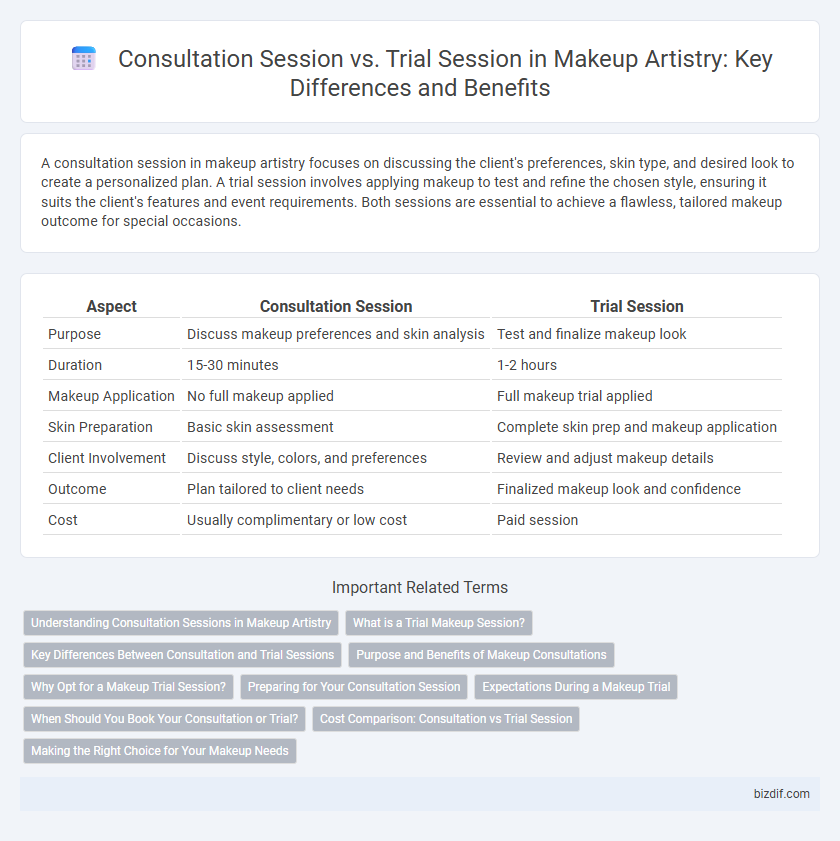A consultation session in makeup artistry focuses on discussing the client's preferences, skin type, and desired look to create a personalized plan. A trial session involves applying makeup to test and refine the chosen style, ensuring it suits the client's features and event requirements. Both sessions are essential to achieve a flawless, tailored makeup outcome for special occasions.
Table of Comparison
| Aspect | Consultation Session | Trial Session |
|---|---|---|
| Purpose | Discuss makeup preferences and skin analysis | Test and finalize makeup look |
| Duration | 15-30 minutes | 1-2 hours |
| Makeup Application | No full makeup applied | Full makeup trial applied |
| Skin Preparation | Basic skin assessment | Complete skin prep and makeup application |
| Client Involvement | Discuss style, colors, and preferences | Review and adjust makeup details |
| Outcome | Plan tailored to client needs | Finalized makeup look and confidence |
| Cost | Usually complimentary or low cost | Paid session |
Understanding Consultation Sessions in Makeup Artistry
Consultation sessions in makeup artistry involve detailed discussions between the artist and client to assess skin type, facial features, and desired look, ensuring personalized makeup application. These sessions focus on aligning expectations, identifying allergies or sensitivities, and selecting appropriate products and techniques tailored to the client's needs. Understanding consultation sessions is crucial for achieving flawless results and building trust before proceeding to a trial or final makeup application.
What is a Trial Makeup Session?
A trial makeup session is a pre-event appointment where the makeup artist tests different looks to ensure the final makeup complements the client's features and matches the event's theme. This session allows adjustments in products, techniques, and styles to suit skin type and preferences, reducing the risk of adverse reactions on the actual day. Unlike a consultation, which primarily gathers information and discusses ideas, the trial session provides a hands-on experience and a visual preview of the makeup outcome.
Key Differences Between Consultation and Trial Sessions
Consultation sessions in makeup artistry primarily involve discussing the client's preferences, skin type, and event details to tailor the makeup plan, while trial sessions focus on executing a full makeup application to test and refine the look. Consultations allow artists to recommend products and techniques based on individual needs, whereas trials provide a hands-on preview, helping identify any allergic reactions or necessary adjustments. Key differences include the consultation's emphasis on planning and information gathering versus the trial's role in practical testing and finalizing the makeup design.
Purpose and Benefits of Makeup Consultations
Makeup consultations serve as an essential foundation for understanding a client's skin type, preferences, and any allergies, ensuring a personalized and safe makeup application. These sessions allow artists to discuss styles, color palettes, and product options, aligning expectations before the actual event. This proactive approach minimizes last-minute surprises, enhances client satisfaction, and improves the overall quality of the makeup artistry experience.
Why Opt for a Makeup Trial Session?
A makeup trial session provides a crucial opportunity to customize the look based on skin type, event style, and personal preferences, ensuring flawless results on the actual day. Unlike a consultation session, which focuses on discussing ideas and preferences, the trial session involves applying products and techniques to test longevity, color choices, and overall compatibility. Opting for a makeup trial reduces the risk of allergic reactions or dissatisfaction and builds confidence in the makeup artist's skills and final outcome.
Preparing for Your Consultation Session
Preparing for your consultation session involves gathering inspiration images, outlining your desired look, and discussing skin concerns or allergies with your makeup artist to ensure a tailored approach. This session focuses on communication and setting expectations, contrasting with the trial session where the makeup is physically tested and refined. Clear preparation during consultation maximizes efficiency and results during the subsequent trial application.
Expectations During a Makeup Trial
During a makeup trial session, clients can expect a comprehensive test of their desired look, allowing adjustments to color, style, and application techniques to ensure satisfaction on the event day. This session focuses on refining the makeup plan based on skin type, lighting conditions, and personal preferences, eliminating surprises and boosting confidence. Clear communication during the trial helps makeup artists understand client expectations and tailor their approach for flawless results.
When Should You Book Your Consultation or Trial?
Book your makeup consultation at least 4 to 6 weeks before your event to discuss your desired look, skin sensitivities, and product preferences. Schedule a trial session 2 to 4 weeks prior to the event to test the makeup products and techniques, ensuring flawless application and adjustment if necessary. Early booking helps secure your artist's availability and provides ample time for revisions, resulting in a personalized and confident final look.
Cost Comparison: Consultation vs Trial Session
A consultation session for makeup artistry typically costs less than a trial session, as it primarily involves discussing preferences, skin type, and overall look without applying makeup. Trial sessions incur higher fees due to the time-intensive process of testing different makeup styles and products to achieve the desired effect before the event. Investing in a trial session helps ensure client satisfaction but comes at a premium price compared to a straightforward consultation.
Making the Right Choice for Your Makeup Needs
A consultation session allows makeup artists to understand your skin type, preferences, and event specifics, ensuring personalized recommendations tailored to your unique features. A trial session provides a hands-on opportunity to test makeup looks, assess product longevity, and make adjustments before the big day. Choosing between these sessions depends on whether you need expert advice or a practical preview to perfect your desired style.
Consultation session vs Trial session Infographic

 bizdif.com
bizdif.com